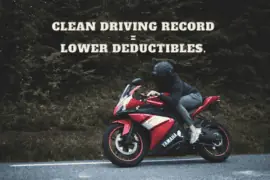If you purchase a motorcycle out of pocket, you only pay the minimum requirements for insurance as per your state. However, if you have financed or leased your motorcycle, then different rules apply regarding the motorcycle insurance needed.
What follows is important information that will help you understand the insurance requirements, average cost, and what happens if you stop paying for insurance on your motorcycle.
Didn't You Try Our Quote Comparison Tool Yet? Save BIG by Doing it!
Table of Content
What Type of Insurance Do I Need for a Financed or Leased Motorcycle?
For financed motorcycles, the lender will most likely require that you obtain comprehensive or collision coverage. This is because the lender owns the motorcycle until you repay the loan. The same is true for leasing motorcycles. This type of insurance means that whether you cause the accident or not, the insurance will cover the amount needed for repair or if the bike is totaled.
Depending on the state’s requirements, you may also be required to purchase personal injury or uninsured motorist coverage. Although both options may be found under comprehensive coverage. Check with your lender and insurance company to ensure you have the proper coverage for your motorcycle.
Is Full Coverage Needed on a Financed Motorcycle?
Not necessarily. It will depend on the lender’s specific requirements or the entity leasing the motorcycle to you. In some cases, liability and uninsured motorist coverage, which is the most common of the state minimum insurance available, will be enough. But do not assume that as many lenders will require comprehensive and collision coverage or some combination of the two.
How Much is the Average Cost of Motorcycle Insurance?
The average cost varies considerably depending on several factors, which include the following.
- Age
- Residence
- Type of Motorcycle
- Driving Record
- Type of Insurance
For example, if you live in California, the average resident pays $1360 per year, while a resident of North Dakota pays just $382.
The rest of the states fall somewhere in between. In addition, comprehensive and collision coverage is considerably more than just liability and uninsured motorists. Check the rates with different insurance companies to find the one that works best for you.
What Happens if I Stop Paying Insurance on a Financed Motorcycle?
If you stop paying for the insurance altogether, you stand in violation of state law and cannot license the motorcycle. The only exceptions are the states that do not require motorcycle insurance.
In addition, the lender or leaser may reclaim the motorcycle if you decide not to provide the recommended coverage. Keep in mind that the insurance is designed to protect the money they have lent to you. They may repossess it without the guarantee of getting paid to repair or replace the motorcycle.
If you are leasing a motorcycle or have received a loan, you will need to get the recommended insurance coverage. Regardless of the state laws, the purchased insurance must fulfill the contract you have signed with the lender or leaser.
Use This Tool for Free and Save on Quotes!





